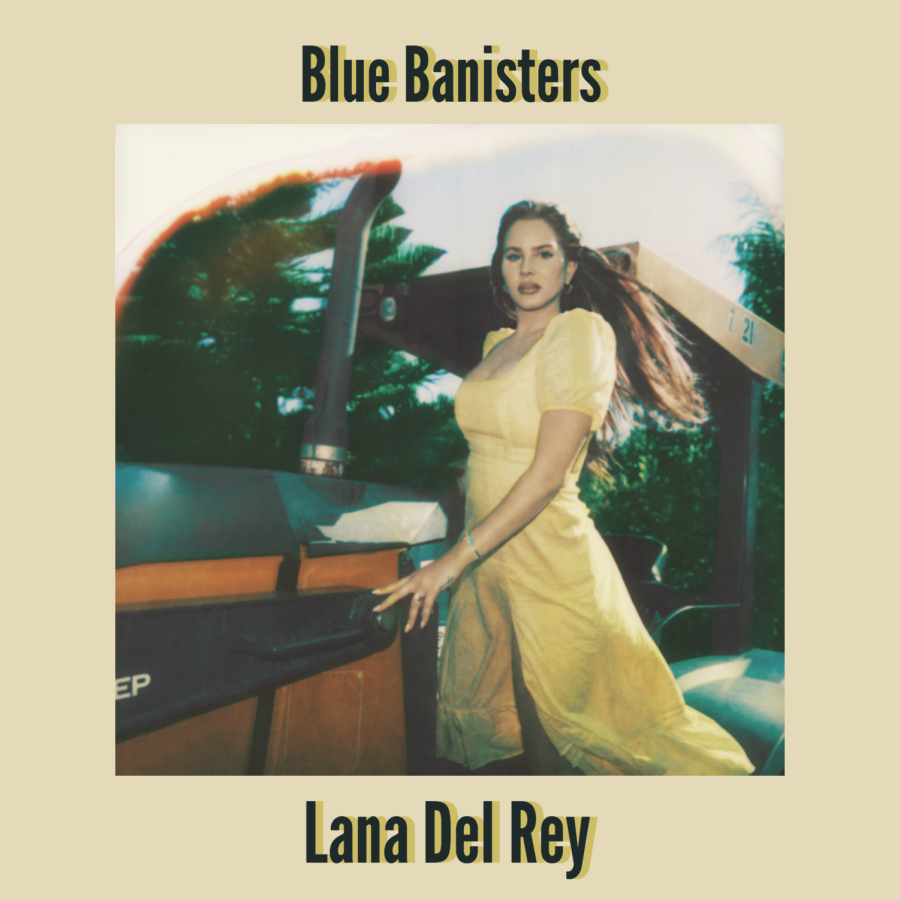‘Blue Banisters’ Brings a New Lana Del Rey to Light
‘Blue Banisters’ was originally titled ‘Rock Candy Sweet,’ but was changed after Del Rey modified the album’s track list and overall sound. Graphic by Shreya Selvaraju.
November 3, 2021
Lana Del Rey released her eighth studio album, Blue Banisters on Friday, Oct. 22. Her second album of 2021, Blue Banisters comes seven months after the divisive Chemtrails Over The Country Club. Trading her usual narrative style for one that is more personal, Blue Banisters shows more of Del Rey, thinning the glamorous lens through which her music is created and consumed.
The album’s first two tracks return to what listeners have learned to expect from Del Rey. On Text Book, Del Rey sings about repeating history and a lover that reminds her of her father, in a way I can only hope is ironic. While the song showcases her voice well, its production and oblivious nature make it one of my least favorite tracks on the album. Utilizing a vague storytelling style, Text Book’s successor, the album’s title track, Blue Banisters, feels like a condensed look at her current life. It talks about a failed romance with a man that promises to paint her banisters but fails to, and how her sisters and friends help her paint the banisters green instead, symbolizing rebirth. She addresses fame, accomplishing what she tried to do on Chemtrails Over The Country Club by holding up her female friendships while acknowledging their limits.
About a third of the songs on Blue Banisters were created for past albums. Living Legend, a tribute to her mentor Jane Powers, was made in 2013 and is pretty but forgettable. Its predecessor, Nectar of the Gods, which was created back in 2014 for her fifth album, Lust for Life, has the same effect. While both songs were remastered and produced to sound more aligned with Del Rey’s current work, they don’t add much to the album, simultaneously blending in and resulting in a lack of cohesiveness.
Contrarily, Dealer, which was originally intended for a now cancelled collaborative album between Del Rey, former Rascals frontman Miles Kane, and Alex Turner of the Arctic Monkeys, stands out from the rest of the album and is my personal favorite. The way Del Rey wails “I don’t want to live,” portrays so much emotion and vocal prowess. Del Rey and Kane create a song that is both lyrically and vocally incredible. The difference between the quality of Dealer and its contemporaries can be attributed both to Kane and that it was created during a different phase of Del Rey’s life.
Black Bathing Suit provides an up-close look at Del Rey’s life. It talks about her current struggles, the weight she’s gained in quarantine, and how she wants a boyfriend. It feels incredibly familiar while giving us a completely new perspective of her. With the line “the only thing that fits is this black bathing suit,” Del Rey speaks about change, and accepting it. She returns to her original tropes of bad girls and glamorous love while breaking away from the unspecific details of her music.
With Wildflower Wildfire, Del Rey tells a lover her origin story. She details her fame and family in a way she’s never done before. With the line “my father never stepped in when his wife would rage at me,” Del Rey sets up her relationship with her mother in a way that tells you everything you need to know. This is the first time in her career Del Rey has ever mentioned her mother, and signifies a big shift in how she talks about herself.
One of the most defining traits of Del Rey’s music is her inclusion of her family. Her father and sisters are often mentioned in lyrics, and on Sweet Carolina, Del Rey, her sister, and her father are credited as songwriters. Del Rey sings to her sister, who at the time the song was created, was expecting a baby. She promises to never be like the men she loves, with the lines “don’t have to write me a letter, ‘cause I’ll always be right here, closer to you than your next breath, my dear.” Del Rey’s vocals are some of the best she’s delivered, and mask her more eccentric lyrics, like “you name your babe Lilac Heaven, after your iPhone 11.” The song closes the album with an ode to her family that is more intimate than we’ve ever seen.
Del Rey has always been incredibly involved in her work, as she co-produced and co-wrote every song on the album. However, her commitment hasn’t always resulted in proximity or transparency to listeners. While we picked up on her emotions, sadness, despair, and how in love she was, we didn’t know much about Del Rey herself. Del Rey’s music has never been very personal, and Blue Banisters is a large milestone on the path to changing that. While the songs she included from years ago don’t fit, the ones that do are incredible. With Blue Banisters, Del Rey creates a body of work that is her most honest yet.



